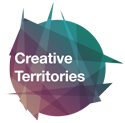Setting the boundaries: reflecting upon the first Creative Territories pre-workshop
Categories: Uncategorized
The 24th April saw the first in a series of ‘creative territory’ workshops surrounding the themes of games hubs and their role in facilitating the games industry, individuals and wider communities take place at the Bristol Games Hub. The half day pre-workshop featured a diverse group of individuals from backgrounds including developers, hub coordinators, researchers and community representatives all sharing their views on what games hubs could offer to the various stakeholders concerned with their activities. Discussions centred largely around what games hubs represent as a means of facilitating the production and creative impetus of indie game development. More widely however, how the production of these games impacted the individuals working on them, the institutions that govern them and the wider communities in which they are produced were themes that came up time and again. In this blog post I want to reflect upon one strand of this discussion that was central to many of these discussions; how can we define territories here?
Territory became a heavily multifaceted notion in our discussions. On one hand territory clearly refers to the space in which the games are created. The hub space that is responsible for creating the games, the one we were sitting in, is the primary territory that usually began any of our discussions. Many of the discussions surrounding this territory focused around the practical benefits of the hub. How the shared and open workspace assisted the creative dynamic of the games that were being made and how those games could be better positioned in their market as a result of people confronting similar issues in the hub was a theme that surfaced often. In contrast to the image of indie game development as a definably independent, at times solitary mode of creative output, the activities of games hubs and the thoughts expressed in the workshop argued the opposite. In order to achieve successful and sustainable indie production creating in an openly communal space is the best way to ensure quality, exposure and originality; as these live tweets touched upon.
Bouncing ideas off others rather than yourself is far more productive and far less soul destroying way to create games #creativeterritories
— Creative Territories (@CreativTurf) April 24, 2014
How do physical spaces encourage sharing in a way that digital spaces cannot replicate? #creativeterritories
— Creative Territories (@CreativTurf) April 24, 2014
How far can we shape the content of a game through the shaping of the context of its development? #creativeterritories
— Creative Territories (@CreativTurf) April 24, 2014
With the rapidly changing nature of the games industry, spaces have to be flexible to harness the potential of people #creativeterritories
— Creative Territories (@CreativTurf) April 24, 2014
Then there is the wider geographic and social territory in which the hub is situated. Territory here is taken to mean the wider communal and societal boundaries in which the activities of the games hub could not only add value but be a catalyst in change. How far and in what ways the games hub effects this notion of territory was a theme central to many of the discussions. The examples of the Bristol Games Hub being situated in the Stokes Croft area and the location of new Leamington Spa Arches group were discussed as case studies for how those geographic areas have undergone a developmental and demographic rejuvenation. The theme here was that creativity and hubs such as these were more than just a symptom of this change, but a vital catalyst in changing the fortunes of those with a stake in the area as these live tweets touched upon.
Creative’s are the pioneers for renovating areas; without culture there is no economy #creativeterritories
— Creative Territories (@CreativTurf) April 24, 2014
How can creative hubs be the catalyst that transforms the development and demographics of an entire area? #creativeterritories
— Creative Territories (@CreativTurf) April 24, 2014
The final notion of territory that was an instrumental if for the most part underlying subject of our discussions was the territory of the games themselves. The games rules, premises and worlds that are being created in hub spaces also have legs of their own that could not be forgotten. How the creative territory of games hubs impact the creative output of these new games and their respective territory was something that was touched upon throughout the discussions. What quickly becomes notable however, is how relational and overlapping all of these notions of territory are. When looking at the territory of games hubs we simply could not afford to separate it from the dynamics the geographic and institutional territories they are situated within and the digital territories they are creating. These are themes I expect will surface again in subsequent workshops as we strive to better understand these relational territories and how they can add value to one another.

One Response to “Setting the boundaries: reflecting upon the first Creative Territories pre-workshop”